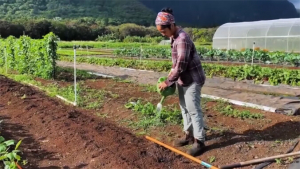University of Hawaiʻi Mānoa professor Susan Crow, who is leading a $40-million U.S. Department of Agriculture (USDA) grant to assist Hawaiʻi farmers, ranchers and foresters in implementing sustainable and climate-smart practices was an invited speaker at the annual American Geophysical Union (AGU) in December 2023, which hosts more than 25,000 attendees.
Crow presented “Overcoming barriers to implementation through a holistic framework for characterizing place-based suites of practices that achieve meaningful climate benefits,” and AGU produced a video of her research that was shown at the conference.

“The climate-smart agriculture session highlighted research around the world tracking holistic impacts of innovative practices on climate and communities and really showcased the intersection of basic research and solutions-oriented approaches,” said Crow, a professor with the UH Mānoa College of Tropical Agriculture and Human Resources. “I was honored to be an invited speaker and open the session.”
The conference connected researchers, students and community members from Hawaiʻi with the greater scientific community to network and share our views with others.
Crow and her team created the Hawaiʻi Partnership for Climate Smart Commodities to develop equitable practices, data systems and decision support tools to promote and actuate meaningful climate benefits in agroecosystems guided by Hawaiʻi-based producers and ancestral practitioners. The project will identify, implement and incentivize the continuation of innovative and Indigenous practices that improve or maintain soil health and generate climate benefits.
“Our current work through the Hawaiʻi Partnership for Climate-Smart commodities is focused on grounding in equity and addressing the many, complex barriers experienced by those in Hawaiʻi to better care for their productive lands,” said Crow. “We aim to support future markets for locally produced, climate-smart (think: ‘in Hawaiʻi, for Hawaiʻi’) food and forest products, and in doing so propel necessary change in local food systems and resiliency of landscapes and communities.”
The AGU attendees come from around the globe to share and learn about the planet and environment, and ask questions surrounding climate change and increasing equity and justice in a changing world.

